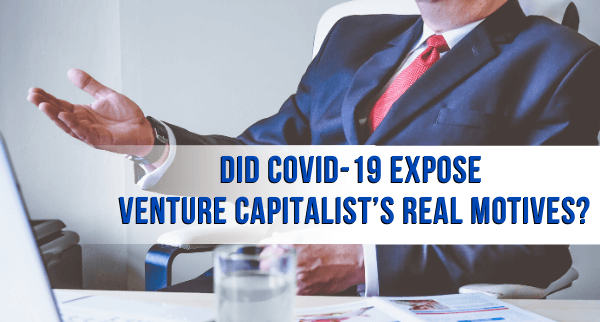
If the COVID-19 pandemic has taught small business owners anything, it’s that: It’s a dog eat dog world and only the fittest will survive. The global epidemic has brought out everyone’s true colors and exposed people for who they really are. One particular group that has been exposed by these vexatious circumstances are the venture capital firms. You know the VC mafia I’ve been trying to warn you about. Contrary to some popular opinion, I have nothing against individual venture capitalists and angels as a whole. Most are extremely smart people. But I have come to the conclusion after thirty years on Wall Street and in Silicon Valley, that our VC markets are simply obsolete. Their methods of picking and choosing where funding goes could use some revamping, representation among venture capitalists could stand to be diversified, and Silicon Valley, in particular, could potentially be useful again if they bring their heads out of the unicorns’ asses.
But all that aside, the Coronavirus pandemic has exposed one of the biggest myths being built up by Silicon Valley VC’s: “Venture capitalists aren’t too different from entrepreneurs. They build great companies and they create jobs.” That statement is full of crap and now you can see why. VCs have different loyalties, sometimes diametrically opposed interests that hinder more than it helps strengthen the small business foundation that is the ultimate backbone of American economic might. During this time of disparity among small businesses, we’re seeing that VC’s aren’t so motivated by building companies and creating jobs after all. They are pulling funding left and right. There has been a drastic decline in� start-up funding, clawbacks have been on the rise and money is being pumped into very specific industries and cut off from everyone else.
Decline in Funding
First-quarter stats showed a significant decline in funding for start-ups and the downward slope is continuing. Seed stage funding has declined by about 22% globally since January. This is usually the first significant source of cash for new ventures, leaving a lot of them stopped in their tracks. On top of that, the decline in funding has caused many companies to have to cut expenses by laying people off. More than 300 start-ups have had to go through with layoffs leaving over 30,000 people jobless just in the past six weeks. Projections show that this is potentially just the tip of the iceberg. If VC’s are so concerned with building jobs as they claim, why wouldn’t more funds be going into small businesses to prevent the need for layoffs? This may or may not be a malicious act. Is it they are more concerned with making investments into the businesses that can actually give them returns at this time or are it the results of their dated means of determining how to allocate funds?
Clawbacks
As I mentioned earlier, the venture capitalist is pulling funds left and right. They are not just withholding investments at this time, but they are also pulling out of funding that they had already promised to businesses. The MAC clause has been a great tool for investors and a deadly assault to start-ups. VC’s backing out of acquisitions has caused many businesses to have to close up shop. This has particularly been heavy for travel and hospitality companies. For instance, Service was an app designed to reimburse customers for delayed or canceled flights and hotels. However, due to Coronavirus, their acquisition was halted and prevented a funding deal that would have been able to extend the company’s cash runway. Granted, the travel industry is taking a huge hit right now, but after pouring 5 million over the last few years into building a company up, was it the best decision to crush the company by suddenly backing out of an acquisition that was previously guaranteed to them?
Where Are the Funds Going
VC’s are holding on to their money pretty tightly these days. Their interest in start-ups is rapidly declining due to the risk posed at this time. And the reason why start-up investment numbers aren’t lower than they are now is because of start-ups in� telehealth, video streaming, online education, and other similar industries that have piqued the interest of investors. Any business that falls within an industry negatively impacted by Coronavirus can forget about funding from VC’s at the moment. Unless, of course, you’re one of their precious unicorns and even their patients for them are wearing thin at this point. They are tightening up on their criteria of later-stage funding and investments in the near future will be rare except for start-ups that provide products or services that fulfill the unique needs created by the outbreak. This may come as a slap in the face for businesses that thought they had a good relationship with VC’s, but hey that’s business. I’ve said it once and I’ll say it again, business isn’t for the overly-sensitive.
Even if venture capitalists are sitting on $120 billion in funds, that still wouldn’t be enough to keep all their businesses afloat. However, they could do much better in determining where these funds are allocated. As small businesses continue to furlough, layoff and even close due to the lack of financial policy backing by their VC’s, you tell me, does it seem like the venture capitalist are loyal to the small businesses that are the backbone of the American economy or are they simply loyal to their own wallets? So far amid this crisis, they haven’t really shown that they are motivated by helping small businesses and creating jobs. The number one motivation thus far has been money. So this brings us back to the question, are businesses and venture capitalist one in the same? I’ll leave that up for you to decide.











